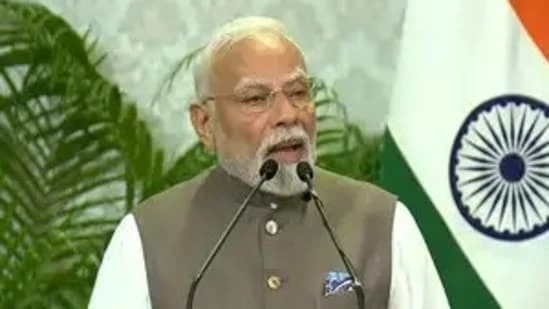Prime Minister Narendra Modi on Friday launched the Gyan Bharatam portal at the International Conference on Gyan Bharatam in New Delhi, describing it as a step towards digitising and preserving India’s manuscript heritage.
“This is not a governmental or an academic event, but it is the proclamation of Indian culture, literature and consciousness,” the Prime Minister said at Vigyan Bhavan, where the three-day conference is being held. “India has the world’s largest manuscript collection of nearly one crore, and the Gyan Bharatam Mission will ensure these legacies are digitised and made accessible.”
The Gyan Bharatam Mission was announced during Budget session in February. It seeks to digitise and catalogue manuscripts across India and abroad, create a central platform for public access, and collaborate with international institutions on preservation and research. Modi said the initiative was aimed at making India’s intellectual traditions available to the world while addressing concerns of “intellectual piracy.”
“Some traditional knowledge has been copied and patented abroad. Digitising manuscripts will curb such piracy and ensure the world accesses authentic sources,” he said.
The Prime Minister noted that India’s manuscripts exist in nearly 80 languages, including Sanskrit, Prakrit, Assamese, Bengali, Kannada, Kashmiri, Konkani, Maithili, Malayalam, and Marathi. He cited the Gilgit manuscripts on Kashmir’s history, Kautilya’s Arthashastra, Buddhist manuscripts from Sarnath, the Charaka and Sushruta Samhitas on Ayurveda, and treatises like the Sulva Sutra and Natya Shastra as examples of India’s intellectual breadth.
“Indian manuscripts reflect humanity’s journey, encompassing philosophy, science, medicine, metaphysics, art, astronomy and architecture,” he said. “From mathematics to binary-based computer science, the foundation of modern science rests on the concept of zero, discovered in India. The Bakhshali manuscript contains evidence of its ancient use.”
Modi said India’s knowledge tradition was based on four pillars – preservation, innovation, addition, and adaptation. He referred to the oral tradition of transmitting the Vedas, innovations in Ayurveda and metallurgy, additions such as new Ramayanas, and reforms brought through debates and “shastrarth” as part of this continuum.
He emphasised the role of citizens and institutions in conserving manuscripts, acknowledging contributions from the Asiatic Society of Kolkata, Dharohar in Udaipur, Saraswati Mahal Library in Thanjavur, among others. “With the support of hundreds of such institutions, more than ten lakh manuscripts have been digitised so far,” he said.
The Prime Minister recounted experiences from his visits abroad to underline the global relevance of India’s heritage. He said manuscripts from Mongolia had been digitised in India and returned, and noted that MoUs had been signed with universities in Thailand and Vietnam to train scholars in Pali, Lanna and Cham languages. He added that manuscripts once taken to Japan and preserved in the Horyu-ji Monastery reflected India’s reach across Asia.
Modi linked the effort to contemporary opportunities, saying digitised manuscripts could contribute to the global cultural and creative industries, valued at about $2.5 trillion. “These crores of manuscripts will serve as a vast data bank. They will inspire data-driven innovation, providing new opportunities for young researchers. New technologies like AI will play a key role,” he said.
He urged youth and universities to take part in the initiative. “Already, 70% of participants are young people – a strong sign of success. Their involvement will accelerate the process of exploring the past through technology and making this knowledge accessible to humanity, grounded in evidence,” he said.
The Prime Minister also linked the repatriation of Indian idols from abroad to India’s growing recognition as a “trusted custodian of heritage.” He said, “Earlier, only a few stolen idols were returned. Now, hundreds of ancient idols are being repatriated. These returns are not driven by sentiment or sympathy, but by confidence that India will preserve them.”
The Ministry of Culture is leading the initiative. The International Conference on Gyan Bharatam, which runs until September 13, has the theme “Reclaiming India’s Knowledge Legacy through Manuscript Heritage.” It brings together scholars, conservationists, technologists and policy experts to deliberate on manuscript preservation, digitisation, legal frameworks, decipherment of ancient scripts and cultural diplomacy.
Union ministers Gajendra Singh Shekhawat and Rao Inderjit Singh were also present at the event.
“India has never measured its knowledge by monetary power,” Modi said. “In ancient times, people donated manuscripts with an open spirit as our ancestors believed that knowledge is the greatest gift. Under this mission, India will strive to unify this shared heritage of humanity.”
